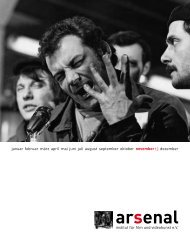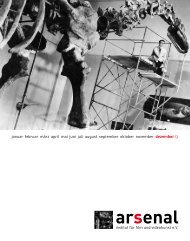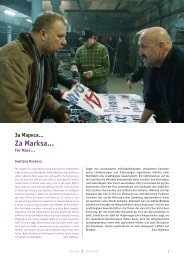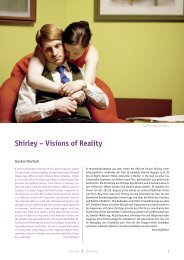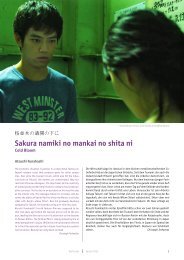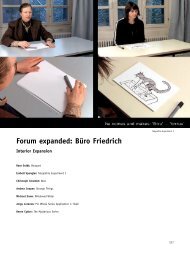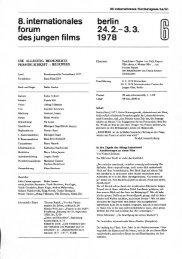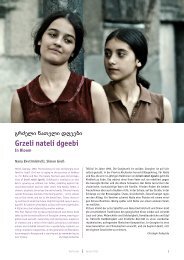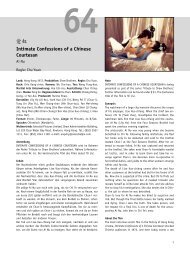Al-khoroug lel-nahar - Arsenal
Al-khoroug lel-nahar - Arsenal
Al-khoroug lel-nahar - Arsenal
Create successful ePaper yourself
Turn your PDF publications into a flip-book with our unique Google optimized e-Paper software.
<strong>Al</strong>-<strong>khoroug</strong> <strong>lel</strong>-<strong>nahar</strong><br />
Coming Forth by Day<br />
Hala Lotfy<br />
One day in the life of Soad, who lives with her mother and bedridden<br />
father on the outskirts of Cairo. While bright sunlight<br />
and the sounds of the city can be made out behind the halfclosed<br />
shutters, everything in the flat exudes the smell of<br />
old age, sickness and stagnation. Her mother works nights in<br />
a hospital and has barely any energy to spare during the day.<br />
Soad too is no longer young, having resigned herself to caring<br />
for her incapacitated father and putting her own life on hold.<br />
The camera patiently follows her movements and daily activities<br />
that have become routine, capturing her frustration as<br />
well as moments of great tenderness.<br />
Hala Lotfy’s impressive debut focuses on the relationship between<br />
light and shadow, within and without, life and death.<br />
Coming Forth by Day, the idea of emerging into light, is the literal<br />
translation of the title of the ancient Egyptian Book of the<br />
Dead. Soad’s longing is palpably directed outside. But when<br />
she leaves the flat in the evening and wanders alone through<br />
Cairo by night, it becomes clear just how far she has already<br />
distanced herself from her own needs. And yet at the end of<br />
the night begins a new day that may still bring change.<br />
Hanna Keller<br />
berlinale forum 2013<br />
© Hassala Productions<br />
Ein Tag im Leben von Soad, die mit Mutter und bettlägerigem Vater am<br />
Rande Kairos lebt. Während hinter halb geschlossenen Läden helles Sonnenlicht<br />
und die Geräusche der Stadt zu vernehmen sind, verströmt im Inneren<br />
der Wohnung alles den Geruch von <strong>Al</strong>ter, Krankheit, Stagnation. Die<br />
Mutter arbeitet nachts in einer Klinik und ist tagsüber ein Schatten ihrer<br />
selbst. Auch Soad ist nicht mehr jung. Ihre Aufgabe, den kranken Vater zu<br />
pflegen, hat sie schicksalsergeben akzeptiert und das eigene Leben hintangestellt.<br />
Geduldig folgt die Kamera ihren routinierten Handgriffen und<br />
Verrichtungen und fängt dabei sowohl ihre Frustration als auch Momente<br />
großer Zärtlichkeit ein.<br />
Hala Lotfys beeindruckendes Debüt richtet den Blick auf das Verhältnis<br />
von Licht und Schatten, Innen und Außen, Leben und Tod. Coming Forth<br />
by Day ist der Titel des Totenbuchs der alten Ägypter, zu Deutsch: ins Licht<br />
hinaustreten. Soads Sehnsucht ist spürbar nach draußen gerichtet. Doch<br />
als sie am Abend die Wohnung verlässt und einsam durch das nächtliche<br />
Kairo treibt, wird deutlich, wie weit sie sich schon von ihren Bedürfnissen<br />
entfernt hat. Indes beginnt am Ende der Nacht ein neuer Tag, der womöglich<br />
Veränderung bringt. Hanna Keller<br />
1
Something slipped away<br />
In a certain sense, I find my self stuck, just like the characters<br />
of my screenplay. I have difficulties revealing and being<br />
my true self. The question is, what stops me? I see no physical<br />
barriers to overcome. So have I created my own barriers, or is<br />
it something beyond my control?<br />
When we were younger we believed there was no such thing as<br />
destiny. We believed in the possibility of changing what we<br />
didn’t accept. But most importantly, we believed in the potential<br />
of cooperation to achieve that change. Much to our disappointment,<br />
it didn’t happen that way. Something slipped away<br />
slowly and unnoticeably. I woke up one day with the thought<br />
that perhaps all was lost. Is it because things are getting uglier<br />
and harder than before, or because I couldn’t stand the constant<br />
pressure to resist the corruption of the outside world, or<br />
just because I suddenly felt deep inside that collective salvation<br />
is unattainable?<br />
Yet I do truly believe that working in cinema is impossible<br />
without really loving people and believing in their nobility<br />
and courage, even of those who can’t take any tangible action<br />
to change or even realise what they need to face.<br />
<strong>Al</strong>l the characters in the film suffer from their inability to open<br />
up and express their emotions at the most pressing times. Suppressing<br />
these emotions leaves them mute, torn between the<br />
feeling of being a victim and the indifference of someone<br />
who has gotten used to pain and can’t move to a better place,<br />
where the tempting lights flash in the distance.<br />
This is a film about how we make our own prisons by accepting<br />
with great nobility a life that is anything but noble.<br />
“Great stories deal with defeat”<br />
Hala Lotfy<br />
With your first long feature <strong>Al</strong>-<strong>khoroug</strong> <strong>lel</strong>-<strong>nahar</strong> / Coming Forth<br />
by Day you pride yourself on creating something that is very different<br />
from what can be found in the Egyptian market. Why?<br />
I liken what is happening in Egypt’s contemporary art<br />
scene to a sort of consecration of a taste that is decadent<br />
and degrading. The only people who defended the regime<br />
during Egypt’s revolution were a handful of football players<br />
and film and television stars who turned their backs on<br />
the masses of fans that supported them. This is part of a<br />
cultural policy that humiliates Egyptians. It is a systematic<br />
policy that affects the daily lives of Egyptians, whether<br />
this has to do with what they eat and drink, or their education<br />
and transportation. Art and cinema are an important<br />
part of this system where citizens are constantly exposed<br />
to degrading productions. The creators of these films and<br />
television programmes are protected by a corrupt justice<br />
system. Artists’ unions that depend on oppressive regimes<br />
will always defend these poor productions because it isn’t<br />
in their interest for Egyptians to watch films that provide<br />
them with the space to feel dignified or human.<br />
Some people find that the characters of <strong>Al</strong>-<strong>khoroug</strong> <strong>lel</strong>-<strong>nahar</strong> /<br />
Coming Forth by Day are passive and defeated while others<br />
have found them to be brave. Was it your purpose to play on this<br />
duality?<br />
berlinale forum 2013<br />
Etwas ist verloren gegangen<br />
In gewisser Hinsicht fühle ich mich genau so festgefahren, wie es die Figuren<br />
meines Drehbuchs sind. Ich habe Schwierigkeiten, mich zu offenbaren<br />
und ich selbst zu sein. Die Frage ist nur: Was fesselt mich? Ich sehe<br />
keine äußerlichen Hindernisse, die ich überwinden müsste. Habe ich meine<br />
Grenzen also selbst geschaffen, oder entziehen sie sich einfach meiner<br />
Kontrolle?<br />
<strong>Al</strong>s wir jünger waren, glaubten wir nicht, dass es so etwas wie Schicksal<br />
gibt. Wir glaubten an die Möglichkeit zu verändern, was wir nicht akzeptieren<br />
wollten. Und vor allem glaubten wir an das Potenzial der Zusammenarbeit,<br />
um solche Veränderungen zu bewirken. Zu unserer großen<br />
Enttäuschung kam es aber anders. Irgendetwas ging uns allmählich unbemerkt<br />
verloren, und eines Tages wachte ich mit dem Gedanken auf, dass<br />
vielleicht alles verloren ist. Lag es daran, dass die Verhältnisse immer unangenehmer<br />
und härter wurden, oder daran, dass ich den ständigen Zwang,<br />
der Korruption durch die Außenwelt Widerstand entgegenzusetzen, nicht<br />
mehr ertragen konnte? Oder vielleicht auch einfach nur an einem Gefühl<br />
tief im Innern, dass es keine kollektive Rettung geben kann?<br />
Trotz allem bin ich fest davon überzeugt, dass man nicht im Film arbeiten<br />
kann, ohne die Menschen zu lieben und an die Würde und den Mut<br />
selbst jener zu glauben, die nichts für eine Veränderung tun können oder<br />
die noch nicht einmal erkennen, welchen Verhältnissen sie sich stellen<br />
müssten.<br />
<strong>Al</strong>le Figuren meines Films leiden unter der Unfähigkeit, sich in schwierigen<br />
Situationen zu öffnen und ihre Gefühle zu zeigen. Sie bleiben stumm,<br />
zerrissen zwischen dem Gefühl, Opfer zu sein, und der Gleichgültigkeit<br />
von Menschen, die sich an das Leiden gewöhnt haben und ihm nicht entkommen<br />
können, obwohl die Lichter eines besseren Lebens verführerisch<br />
in der Ferne funkeln.<br />
Dieser Film handelt davon, wie wir unsere eigenen Gefängnisse erschaffen,<br />
indem wir mit großer Würde ein Leben akzeptieren, das alles andere<br />
als würdig ist.<br />
Hala Lotfy<br />
„Bedeutende Geschichten handeln von Niederlagen“<br />
Mit <strong>Al</strong>-korough <strong>lel</strong>-<strong>nahar</strong> / Coming Forth by Day haben Sie ein Werk geschaffen,<br />
das sich stark von Filmen unterscheidet, die auf dem ägyptischen<br />
Markt üblich sind. Warum?<br />
In der ägyptischen Kunstszene wird meines Erachtens derzeit auf ebenso<br />
dekadente wie würdelose Weise der gute Geschmack preisgegeben.<br />
Die Einzigen, die während der Revolution in Ägypten das Regime verteidigt<br />
haben, waren ein paar Fußballspieler sowie Film- und Fernsehstars,<br />
die den Massen ihrer Fans einfach den Rücken gekehrt haben. Das<br />
ist Teil einer erniedrigenden Kulturpolitik für Ägypter; eine systematische<br />
Strategie, die das <strong>Al</strong>ltagsleben der Ägypter betrifft, egal ob es darum<br />
geht, was sie essen oder trinken, egal ob es sich um Bildung oder<br />
das Transportwesen handelt. Die Kunst und das Kino sind ein wichtiger<br />
Teil dieses Systems, in dem die Bürger permanent mit erniedrigenden,<br />
würdelosen Erzeugnissen konfrontiert sind. Die Macher dieser Filme<br />
und Fernsehprogramme werden von einer korrupten Justiz geschützt.<br />
Künstlervereinigungen, die von repressiven Regimen abhängen, werden<br />
solche schlechten Produktionen immer verteidigen, weil es nicht<br />
in ihrem Interesse liegt, dass die Ägypter Filme sehen können, die ihnen<br />
den Freiraum geben, sich als Menschen gewürdigt zu fühlen.<br />
Ein Teil der Zuschauer nimmt die Figuren in <strong>Al</strong>-korough <strong>lel</strong>-<strong>nahar</strong> / Coming<br />
Forth by Day als passiv und niedergedrückt wahr, andere finden sie tapfer.<br />
Warum diese Zwiespältigkeit?<br />
2
A brave surrender to certain circumstances is what moves<br />
the characters. In my opinion human beings are noble<br />
when they accept defeat with pride. My new project Teama<br />
will incorporate a huge moment of defeat that will turn<br />
into a victory for the human spirit. Great stories deal with<br />
defeat on a human level and have their characters accept<br />
it with pride.<br />
You seem to be affected by documentary filmmaking.<br />
The film resembles a documentary because the characters<br />
go through experiences and feelings that are realistic.<br />
I was surprised when the actor Ahmad Lutfi accepted<br />
the role of the dying father. When I asked what his reasons<br />
were, he told me that he cared for his mother when she<br />
was very ill, and that he would consider playing the part<br />
as homage to her. His experience contributed towards the<br />
quality of his acting and to the character.<br />
Some people have interpreted the circular movement of the camera<br />
in certain scenes as a reference to Sufism, while others felt<br />
that it reflected the state of the characters as they live their lives<br />
‘going around in circles’. What was your purpose for using this<br />
technique?<br />
In my opinion the circles are a reference to Sufism. I mean<br />
it as a reference to the idea that we leave one place only<br />
to enter another. <strong>Al</strong>so, to the idea that death is only the<br />
means of resurrecting to a new life and that accepting reality<br />
is only a means to finding new hope.<br />
Why did you choose to depict the lives of a working-class family?<br />
It was not a choice. This is the class that I belong to and I<br />
know no other.<br />
Which foreign directors are you influenced by?<br />
The director that influenced the way I look at cinema the<br />
most is Béla Tarr. I consider him to be the greatest director<br />
alive.<br />
Interview: Vicky Habib, <strong>Al</strong> Hayat, 9 November 2012<br />
The two tones of life<br />
The ‘day’ in <strong>Al</strong>-<strong>khoroug</strong> <strong>lel</strong>-<strong>nahar</strong> / Coming Forth by Day is that<br />
of the living, but also of all things light opposing darkness,<br />
oblivion, annihilation and death. The film is actually the end<br />
of a journey of a man, his relationships in this context with<br />
his daughter and his wife, and a whole evanescent world that<br />
eludes him. The author of this article is the actor who plays<br />
this character.<br />
He is surrounded by a team for whom he feels a sympathy and<br />
affection that is very real and very authentic. Is it due to this<br />
context of recreation of the universe that is ‘cinema’? That<br />
may be so, but it is also the spirit of friendship that exists<br />
within this team, they are all young, very talented and oppose<br />
commercial cinema. They met almost by chance and have built<br />
this symbiosis. As stated by most of these young people, the<br />
future belongs to independent cinema. <strong>Al</strong>-<strong>khoroug</strong> <strong>lel</strong>-<strong>nahar</strong> /<br />
Coming Forth by Day is a kind of tribute and remembrance of<br />
those who are at the end of their lives. Farewells are made in a<br />
very emotional context: where life in its final stage, it frees itself<br />
from the everyday and will remain beyond the ephemeral.<br />
berlinale forum 2013<br />
Die Figuren sind in der Lage, mit Tapferkeit vor bestimmten Umständen<br />
zu kapitulieren. Meiner Meinung nach verhalten Menschen sich würdig,<br />
wenn sie eine Niederlage mit Stolz akzeptieren. In meinem neuen Projekt<br />
Teama wird das Thema einer Niederlage, die sich in einen Sieg für<br />
den menschlichen Geist verwandelt, eine zentrale Rolle spielen. Bedeutende<br />
Geschichten handeln immer von menschlichen Niederlagen,<br />
die die Protagonisten mit Stolz und Würde akzeptieren.<br />
Sie scheinen vom Dokumentarfilm beeinflusst.<br />
Der Film ähnelt einem Dokumentarfilm, weil die Erfahrungen und Gefühle,<br />
die die Figuren erleben, realistisch sind. Ich war überrascht, dass<br />
der Schauspieler Ahmad Lutfi bereit war, die Rolle des sterbenden Vaters<br />
zu spielen. <strong>Al</strong>s ich ihn nach seinen Gründen fragte, erzählte er mir,<br />
dass er sich um seine Mutter gekümmert hat, als sie schwer krank war,<br />
und dass er die Rolle in <strong>Al</strong>-korough <strong>lel</strong>-<strong>nahar</strong> / Coming Forth by Day<br />
als eine Hommage an sie betrachte. Seine Erfahrungen steigerten die<br />
Qualität seines Spiels und vertieften den Charakter der Figur.<br />
Manche verstehen die Kreisbewegung, die die Kamera in bestimmten Szenen<br />
vollführt, als eine Anspielung auf den Sufismus. Andere sehen darin einen<br />
Hinweis auf den Zustand der Protagonisten, deren Leben sich gewissermaßen<br />
im Kreis dreht. Warum haben Sie dieses Mittel eingesetzt?<br />
Die Kreise sind tatsächlich eine Anspielung auf den Sufismus, auf den<br />
Gedanken, dass wir einen Platz nur verlassen, um einen anderen einzunehmen;<br />
dass der Tod für uns die Grundlage für die Auferstehung zu<br />
einem neuen Leben ist, und die Akzeptanz der Realität die Voraussetzung<br />
dafür, dass neue Hoffnung entstehen kann.<br />
Warum haben Sie sich dafür entschieden, das Leben einer Familie aus der Arbeiterklasse<br />
zu porträtieren?<br />
Das ist die Klasse, der ich angehöre, ich kenne keine andere.<br />
Von welchen Regisseuren aus dem Ausland wurden Sie beeinflusst?<br />
Der Regisseur, der mich künstlerisch am meisten beeinflusst hat, ist<br />
Béla Tarr. Ich halte ihn für den bedeutendsten lebenden Filmregisseur.<br />
Interview: Vicky Habib, <strong>Al</strong> Hayat, 9. November 2012<br />
Das Chiaroscuro des Lebens<br />
Der „Tag“ in <strong>Al</strong>-korough <strong>lel</strong>-<strong>nahar</strong> / Coming Forth by Day ist der Tag der<br />
Lebenden, aber auch aller lichten Dinge, die sich der Dunkelheit, dem Vergessen,<br />
der Vernichtung und dem Tod entgegenstellen. Der Film handelt<br />
vom Ende der Lebensreise eines Mannes, seiner Beziehung zu seiner Tochter<br />
und seiner Frau und der gesamten vergänglichen Welt, die ihm entschwindet.<br />
Der Verfasser dieses Artikels ist der Schauspieler, der diesen<br />
Mann verkörpert.<br />
Er ist bei dieser Produktion von einem Team umgeben, für das er eine sehr<br />
reale und tiefe Sympathie und Zuneigung empfindet. Liegt das daran, dass<br />
man gemeinsam gewissermaßen an der Wiedererschaffung des Universums<br />
arbeitet, die das Kino ausmacht? Bestimmt spielt das eine Rolle, aber<br />
unabhängig davon herrscht in diesem Team auch der Geist echter Freundschaft:<br />
Die Beteiligten sind allesamt jung, sehr begabt und Gegner des<br />
kommerziellen Kinos. Sie haben sich mehr oder weniger zufällig kennengelernt<br />
und inzwischen ein symbiotisches Verhältnis zueinander entwickelt.<br />
Die meisten der jungen Menschen, die an diesem Film beteiligt sind,<br />
sind davon überzeugt, dass dem Autorenfilm die Zukunft gehört.<br />
<strong>Al</strong>-korough <strong>lel</strong>-<strong>nahar</strong> / Coming Forth by Day ist eine Hommage und eine<br />
Erinnerung an jene, die am Ende ihres Lebens angekommen sind. Das Abschiednehmen<br />
geschieht unter sehr emotionalen Umständen: In seinem<br />
letzten Stadium befreit das Leben sich vom <strong>Al</strong>ltäglichen und Flüchtigen.<br />
3
This context is made up of affection, embarrassment, tantrums<br />
and even indifference. The daughter of the patient, played by<br />
young actress Donia Maher, is torn between her love for her father,<br />
her distress of being at his bedside, and also the sentimental<br />
emptiness she feels around her. A kind of confrontation<br />
plays out with her mother, a nurse by profession, who is<br />
lost in this situation.<br />
Donia plays a young woman who neglects herself and is a bit<br />
lost in her life. Sometimes she takes care of her father and<br />
sometimes she sort of runs away in a deserted urban space. Her<br />
very expressive approach and her gestures of affection and relief<br />
made this author feel as if she really were his own daughter.<br />
When she forced him to eat in one scene, he was really shaken<br />
beyond his film role as her father. The apparent indifference of<br />
his wife adds to the perplexity of a lost man.<br />
In the end, during this shoot the actor/author of this article<br />
has seen a good expression of chiaroscuro, the two tones of<br />
life.<br />
Ahmad Lutfi, July 2011<br />
(Ahmad Lutfi passed away two months after shooting wrapped.<br />
–Ed.)<br />
Hala Lotfy was born on 3 July 1973 in Egypt. She graduated<br />
from Cairo University in 1995 with a degree in economics and<br />
political science, after which she studied at the Cairo Film Institute<br />
until 1999. After working for two years as an assistant<br />
director, in 2005 and 2006 she directed seven films for the documentary<br />
series Arabs of Latin America for the international TV<br />
broadcaster <strong>Al</strong> Jazeera. She began producing her feature film<br />
debut, <strong>Al</strong>-<strong>khoroug</strong> <strong>lel</strong>-<strong>nahar</strong> / Coming Forth by Day, in 2007,<br />
and completed it in 2012 after a break in production. In 2010,<br />
Hala Lotfy founded the independent production company Hassala<br />
Productions, which aims to support young artists.<br />
Films<br />
1998: A Rehearsal (17 min.). That Beautiful Voice (4,5 min.).<br />
1999: No Waiting Please (8 min.). 1999: Four Scenes (10 min.).<br />
2000: Greeting Pattern (4,5 min.). 2001: Images of Water and<br />
Earth (26 min.). 2005: Feeling Cold (47 min.). 2005/ 2006: Arabs<br />
of Latin America (7 x 47 min.). 2012: <strong>Al</strong>-<strong>khoroug</strong> <strong>lel</strong>-<strong>nahar</strong> /<br />
Coming Forth by Day.<br />
Country: Egypt, United Arab Emirates 2012. Production company:<br />
Hassala Productions, Cairo; NY Consultancy, London. Director,<br />
screenwriter: Hala Lotfy. Director of photography:<br />
Mahmoud Lotfi. Costume design: Naira Dahshoury. Sound: Abdul<br />
Rahman Mahmoud. Editor: Heba Othman. Producer: Manal<br />
Khalil, Hala Lotfy.<br />
Cast: Donia Maher (Suad), Salma <strong>Al</strong>-Najjar (mother), Ahmad Lutfi<br />
(father), Doaa Oreyqat (girl), Ahmad Sharaf (minibus driver),<br />
Galal Beheiri (soldier), Nadia <strong>Al</strong>-Gindi (nurse).<br />
Format: DCP, colour. Running time: 96 min. Language: Arab.<br />
World premiere: 18 October 2012, Abu Dhabi Film Festival.<br />
Contact: Hassala Productions, Cairo.<br />
berlinale forum 2013<br />
Zuneigung, Verlegenheit, Wutanfälle und auch Gleichgültigkeit prägen die<br />
Situation. Die Tochter des Leidenden, dargestellt von Donia Maher, ist zerrissen<br />
zwischen der Liebe zu ihrem Vater, der Belastung, an seinem Bett<br />
sitzen zu müssen, und einer emotionalen Leere, die sie um sich herum<br />
wahrnimmt. Es ergibt sich eine Konfrontation mit ihrer Mutter, einer Krankenschwester,<br />
die von den Umständen überfordert ist.<br />
Donia spielt eine junge Frau, die sich vernachlässigt und verloren fühlt.<br />
Manchmal kümmert sie sich liebevoll um ihren Vater, manchmal rennt sie<br />
einfach davon in die menschenleere Stadt. Ihr ausdrucksvolles Spiel, ihre<br />
liebevollen, tröstenden Gesten vermitteln dem Verfasser dieser Zeilen<br />
ein Gefühl, als wäre sie wirklich seine Tochter. Wenn sie ihn in einer Szene<br />
zum Essen zwingt, erschüttert ihn das auch jenseits seiner Rolle als Vater.<br />
Dazu kommt die scheinbare Gleichgültigkeit der Ehefrau, die die Bestürzung<br />
und Verwirrung des verlorenen Mannes noch steigert.<br />
Der Verfasser dieser Zeilen fand in diesem Projekt genau jenes Chiaroscuro,<br />
das das Leben ausmacht.<br />
Ahmad Lutfi, Juli 2011<br />
Anm. d. R.: Der Schauspieler Ahmad Lutfi verstarb zwei Monate nach Abschluss<br />
der Dreharbeiten.<br />
Hala Lotfy wurde am 3. Juli 1973 in Ägypten geboren.<br />
1995 schloss sie ein Studium der Wirtschafts-<br />
und Politikwissenschaften an der Uni Kairo ab. Anschließend<br />
studierte sie bis 1999 am Cairo Film<br />
Institute. Nach zwei Jahren als Regieassistentin<br />
drehte sie 2005/06 für den Fernsehsender <strong>Al</strong> Jazeera<br />
sieben Folgen der Serie Arabs of Latin America.<br />
2007 begann sie mit der Arbeit an ihrem Spielfilmdebüt<br />
<strong>Al</strong>-<strong>khoroug</strong> <strong>lel</strong>-<strong>nahar</strong> / Coming Forth by<br />
Day, das sie 2012 nach einer Unterbrechung fertigstellte. 2010 gründete<br />
Hala Lotfy die unabhängige Filmproduktion Hassala Productions, deren<br />
Ziel es unter anderem ist, junge Künstler zu unterstützen.<br />
Filme<br />
1998: A Rehearsal (17 Min.). That Beautiful Voice (4,5 Min.). 1999: No Waiting<br />
Please (8 Min.). 1999: Four Scenes (10 Min.). 2000: Greeting Pattern<br />
(4,5 Min.). 2001: Images of Water and Earth (26 Min.). 2005: Feeling Cold<br />
(47 Min.). 2005/ 2006: Arabs of Latin America (7 x 47 Min.). 2012: <strong>Al</strong>-<strong>khoroug</strong><br />
<strong>lel</strong>-<strong>nahar</strong> / Coming Forth by Day.<br />
Land: Ägypten, Vereinigte Arabische Emirate 2012. Produktion: Hassala<br />
Productions, Kairo; NY Consultancy, London. Regie, Buch: Hala Lotfy.<br />
Kamera: Mahmoud Lotfi. Kostüme: Naira Dahshoury. Ton: Abdul Rahman<br />
Mahmoud. Schnitt: Heba Othman. Produzenten: Manal Khalil, Hala Lotfy.<br />
Darsteller: Donia Maher (Suad), Salma <strong>Al</strong>-Najjar (Mutter), Ahmad Lutfi<br />
(Vater), Doaa Oreyqat (Mädchen im Kleinbus), Ahmad Sharaf (Kleinbusfahrer),<br />
Galal Beheiri (Soldat), Nadia <strong>Al</strong>-Gindi (Krankenschwester).<br />
Format: DCP, Farbe. Länge: 96 Minuten. Sprache: Arabisch. Uraufführung:<br />
18. Oktober 2012, Abu Dhabi Film Festival. Kontakt: Hassala Productions,<br />
Kairo.<br />
4



